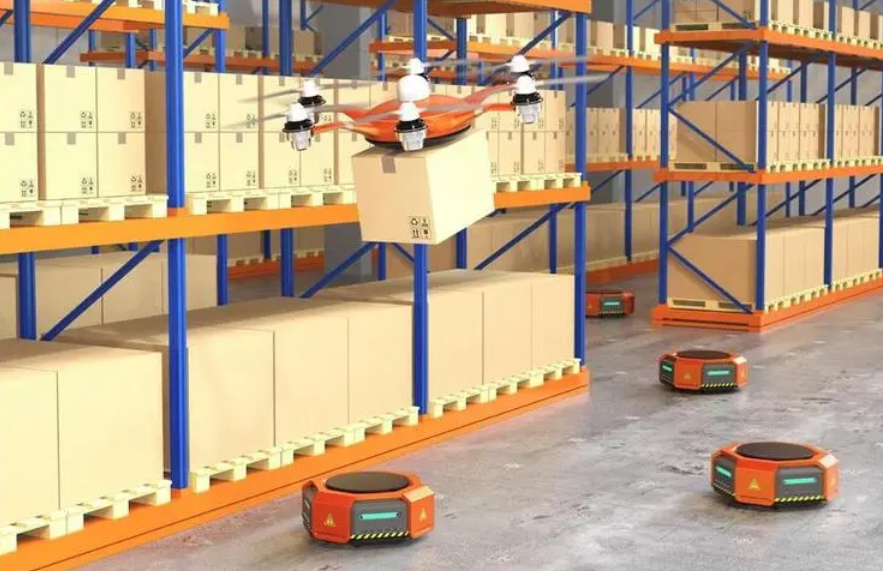In today’s rapidly evolving landscape, integrating Artificial Intelligence (AI) with Warehouse Management Systems (WMS) has emerged as a pivotal trend shaping the future of logistics and supply chain operations. This article delves into the realm of AI-powered warehouse management, exploring the tasks that AI can enhance, the advantages it offers, and the challenges that organizations may encounter.
In the dynamic realm of warehousing, AI promises to revolutionize traditional processes and unlock new levels of efficiency and productivity. Let’s explore some key areas where AI can drive transformative changes:
Efficient inventory management lies at the core of successful warehouse operations. AI technologies, such as machine learning algorithms, empower warehouses to forecast demand patterns accurately, optimize stock levels dynamically, and minimize costly issues like overstock or stockouts. By harnessing AI-driven insights, warehouses can achieve optimal inventory levels, reduce waste, and enhance operational efficiency.
Order picking is critical to warehouse operations, often influencing customer satisfaction and operational costs. AI-driven algorithms can analyze historical data, real-time order volumes, and warehouse layouts to optimize order-picking routes. AI streamlines order fulfillment processes and improves operational agility by identifying the most efficient paths, minimizing travel time, and maximizing picker productivity.
Maintaining product quality and ensuring the reliability of warehouse equipment is vital for seamless operations. AI sensors integrated within the warehouse infrastructure can monitor product conditions in real time, detect abnormalities, and trigger alerts for proactive maintenance interventions. Through predictive analytics, warehouses can anticipate maintenance requirements, reduce downtime, and uphold stringent quality standards, ultimately enhancing operational resilience.

The adoption of AI technologies in warehouse management offers a multitude of benefits that transcend conventional practices. Here are some key advantages of integrating AI into warehouse operations:
AI-driven automation optimizes repetitive tasks, minimizes human errors, and boosts operational efficiency. By deploying AI-powered systems for inventory management, order processing, and route optimization, warehouses can expedite workflows, shrink lead times, and deliver orders with unparalleled precision.
One of the standout features of AI is its ability to generate real-time data insights that empower decision-making and operational responsiveness. Warehouse managers with AI-enabled systems can access up-to-the-minute information on inventory levels, order statuses, and operational performance. This real-time visibility enables swift decision-making, facilitates agile adjustments to fluctuating demands, and enhances overall operational transparency.
AI’s predictive analytics capabilities equip warehouses with anticipatory insights into market trends, consumer behaviors, and demand fluctuations. By leveraging AI algorithms to forecast demand patterns accurately, warehouses can align inventory levels proactively, streamline procurement processes, and optimize supply chain operations. The ability to predict demand shifts and adapt swiftly to changing market dynamics positions warehouses for sustained competitiveness and customer satisfaction.
While integrating AI technologies promises transformative benefits, organizations embarking on this journey must navigate several challenges to ensure successful implementation. Here are some key challenges associated with incorporating AI into warehouse management:
One of the primary hurdles in adopting AI technologies in warehouses is the initial investment costs. Acquiring AI-enabled hardware, software solutions, and infrastructure upgrades requires substantial capital allocation. Furthermore, training staff members and implementing new processes entail additional expenses. While the long-term benefits of AI implementation are promising, organizations must carefully evaluate and justify the upfront costs to realize sustainable returns on their investments.
Integrating AI technologies seamlessly into existing Warehouse Management Systems (WMS) and operational workflows poses technical complexities that demand meticulous planning and expertise. Ensuring interoperability between AI solutions and legacy systems, data synchronization, and system compatibility are crucial considerations in the integration process. Effective coordination among IT teams, warehouse personnel, and external vendors is essential to overcome integration challenges and ensure a smooth transition to AI-enhanced operations.
Introducing AI technologies in warehouse operations necessitates a significant shift in workforce dynamics and skill sets. As AI systems take on routine tasks and decision-making processes, warehouse employees must adapt to new roles that complement AI functionalities. Employee training programs, skill development initiatives, and change management strategies are essential to facilitate a seamless transition and foster a collaborative environment where humans and AI systems work synergistically. Organizations must prioritize employee engagement, provide continuous learning opportunities, and promote a culture of innovation to embrace AI’s transformative potential in warehouse management successfully.
In conclusion, the fusion of artificial intelligence and warehouse management systems heralds a new era of intelligent warehousing, where data-driven insights, automation, and predictive capabilities converge to redefine warehouse operations. By seizing the opportunities presented by AI technologies and navigating the challenges with foresight and determination, organizations can embark on a transformative journey towards optimized warehouse management, enhanced customer experiences, and sustainable competitive advantage in the dynamic landscape of logistics and supply chain management.
Integrating AI and WMS is a technological advancement and a strategic imperative for organizations seeking to thrive in the digital age. By embracing innovation, driving operational excellence, and prioritizing adaptability, warehouses can chart a course toward a future where AI catalyzes growth, efficiency, and innovation in warehouse management.

Last updated: 2025-05-06

Last updated: 2025-04-01

Last updated: 2025-03-03

Last updated: 2025-02-05